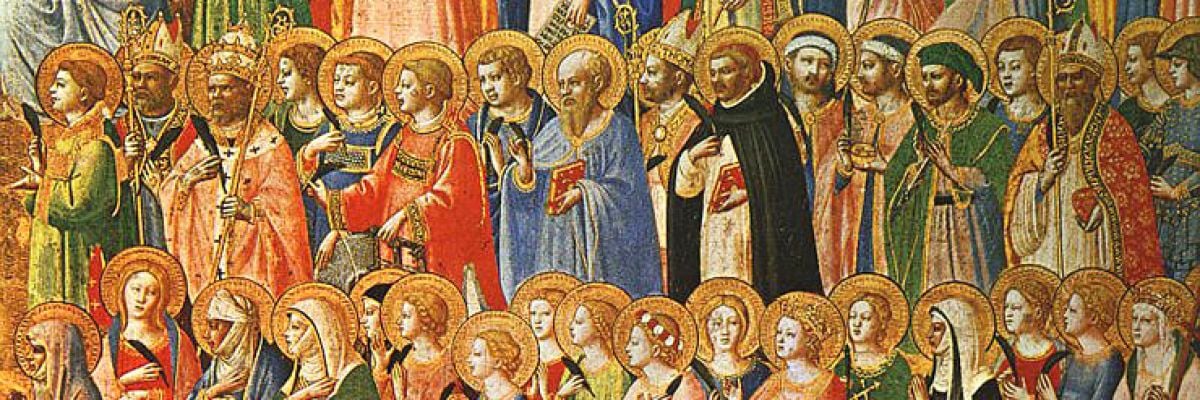
At this very moment there is probably someone in the world praying the Hail Mary or asking someone like St. Anthony to pray for him or her. In fact, there are probably millions of people asking specific saints to pray for them at any given moment. How can the saints in heaven hear thousands of prayers made in different languages at the same time? Wouldn’t this make the saints all-knowing, which is a quality that God alone possesses?
Not impossible for God
It might be difficult to understand how saints in heaven could hear our prayers by themselves, but for God nothing is impossible (see Matthew 19:26).
At Pentecost God gave the apostles the ability to speak and understand different languages (see Acts 2:4-6), so there’s no reason to think he wouldn’t give the saints this same ability. Moreover, if God will give us glorified bodies at the end of time, then why wouldn’t he also give us glorified minds that can know much more than normal human minds? If earthly mothers can manage to hear more than one of their children seeking their attention at the same time, then there’s no reason to think God has not blessed our heavenly mother, Mary, to do the same on a larger scale.
Finally, if God can create an entire universe from nothing, then to say he couldn’t give his creatures the ability to understand lots of prayers would be to deny God’s omnipotence or the truth that God is all powerful. But does the saints’ ability to hear so many prayers make them omniscient, or all knowing, like God?
The nature of omniscience
According to Protestant apologist Eric Svendsen, “In order to hear all those prayers at once [Mary and other saints in heaven] would have to be omniscient (“all knowing”)—an attribute that is the property of God alone” (Evangelical Answers: A Critique of Current Roman Catholic Apologetics, 209). Svendsen is mistaken, because even though the prayers addressed to Mary and the saints are large in number, they are still finite, so knowing them does not entail omniscience. To be fair, Svendsen says this reply fails, because “one may as well argue that omniscience is not needed even by God himself since all things that can be known—no matter how many—are nevertheless limited to a finite number.”
The problem with Svendsen’s argument is that he misunderstands the nature of omniscience. God is not all knowing because he knows an infinite number of truths (as Svendsen seems to suggest). God is all knowing because his knowledge has no limits. The saints in heaven can answer our prayers even if they don’t know every truth God knows (such as the atomic structure of a star in a random part of the universe). The saints’ abilities to do what we cannot does not make them gods. It only makes them God’s friends empowered by him to assist their brothers and sisters on Earth.
Svendsen also doesn’t seem to understand that some of God’s attributes are communicable and can be shared with his creatures. For example, God’s love is communicable, because we are called to love as God loves (see 1 John 4:19). But God’s simplicity, or God’s ability to exist as being itself without division or deficiency, is incommunicable. No creature, even with divine assistance, could exist as undivided being itself, because to exist in that way is what it means to be God.
However, some of God’s attributes are both communicable and incommunicable, depending on how they’re understood. God’s holiness is communicable, because he tells believers, “You shall be holy, for I am holy” (1 Pet. 1:16). However, God’s intrinsic holiness, or the fact that God is holy by virtue of his own nature, is incommunicable, because that kind of existence belongs to God alone (see Revelation 15:4).
Likewise, 1 Timothy 6:16 says God alone possesses immortality (Greek, athanasios; literally, “without death”), but Jesus promises that believers will never die (see John 11:26). Intrinsic immortality, or having unending existence as the essence of one’s nature, belongs to God alone, even though God can share some of this attribute with his creatures by preventing them from dying.
So what about omniscience? Only God has the ability to know all truth, because he alone sustains every truth and every created thing. But God, as the Catechism of the Catholic Church says, “wanted to make his creatures share in his being, wisdom and goodness” (CCC 295).
If God can grant people on Earth supernatural knowledge about the future or about the afterlife, then there is no reason to deny God’s ability to grant angels and saints in heaven knowledge of our prayers. Deuteronomy 29:29 puts it well: “The secret things belong to the Lord our God; but the things that are revealed belong to us and to our children for ever.”
A devilish detail
1 Peter 5:8 says, “Your adversary the devil prowls around like a roaring lion, seeking someone to devour.” Remember that Peter’s warning is given to all Christians in all times and all places. This means that the devil, who is a mere creature, has the ability to ensnare billions of Christians at the same time with unique temptations he has crafted for each of them. (Even if the devil personally doesn’t tempt us, and only his demons do, Satan himself is organizing all of this. This means that in order to lead his demonic kingdom he has mental abilities that far surpass what humans in this life possess.)
If God’s enemy can have knowledge of what billions of humans do in order to tempt them, then why wouldn’t God’s friends, or the saints, have similar kinds of knowledge and use that knowledge to pray for us?
Scripture seems to suggest that’s the case. The author of Hebrews, after recounting the heroes of the Old Testament, says, “since we are surrounded by so great a cloud of witnesses, let us also lay aside every weight, and sin which clings so closely, and let us run with perseverance the race that is set before us” (Heb. 12:1).



